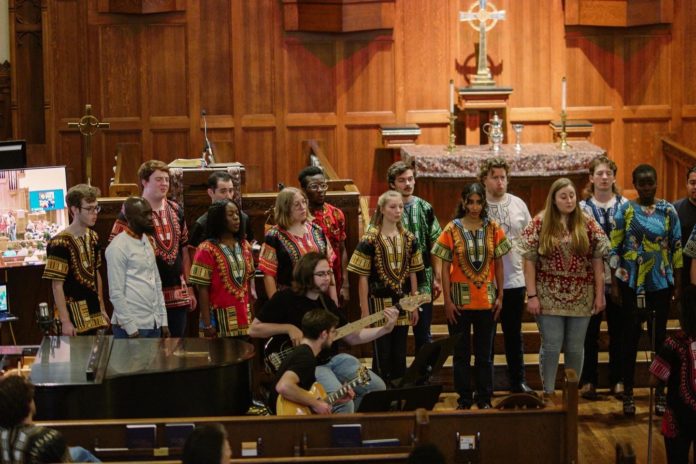
By Olivia Turner | Staff Writer
When attendees walk into First Presbyterian Church Waco as the Angaza choir performs, their eyes and ears are met with harmonic voices joined in song and joyous dancing.
These unique and lively shows are put on by Texas’s very first African community choir, the second in the United States, made up of Baylor students and Wacoans.
“Angaza,” which means “to shine” or “illuminate” in Swahili, is a fitting name as the group has been gracing Waco with their vibrant dashikis of reds, blues and greens and their spirited performances since last spring.
Not only is the choir different in their looks and sounds, but also in their learning methods, according to director and choreographer Derick Etale, who was born and raised in Rwanda.
As a second-year graduate student and major in church music at Baylor, Etale has choreographed dances for several of the mens’ choir performances.
“Back home when you start dancing, everybody just looks at you and follows,” Etale said.
He said he uses the same watch-and-follow manner when teaching dances to Angaza members with a call-and-response method when teaching the lyrics of songs. The songs are sung in Bantu, Twi, Swahili Xhosa and isiZulu languages. In his culture, Etale said, song and dance are inseparable.
Etale’s goal with methods like these — as opposed to the following of notes and lyrics on sheet music — was to bring his African cultures to America and to share it with the Waco community.
“Instead of reading a written story, you’re telling it how you heard it from someone else,” said Plano freshman Sarah Davis, a member of the choir.
Davis said this more raw and emotional way of sharing music is inspired by the Holy Spirit and allows her to experience the full extent of joy felt when using song and dance to praise God.
Davis isn’t the only member of the choir affected spiritually by Etale’s chosen songs. Monica Malas, a Queens, N.Y., freshman and soloist, said she can feel the same unique joy and celebration when she sings.
“It gives light to a different way of interacting with music,” Malas said. “Everything comes together and I definitely do think that African music shows a different side of that joy, of that freedom that Western music doesn’t.”
In addition to the unique joy Angaza conveys, Malas said the folk songs are also different from Western music because they are based on rhythms and chords often unknown to American audiences.
Though the folk songs Etale selects are often foreign to his audience, he said it is important to preserve them and the language barrier does not stop people from enjoying and connecting with them.
“That is why choirs all over the world sing pieces from Africa, because they have been notated and they are out here in public,” Etale said. “They’re meant to be performed.”




